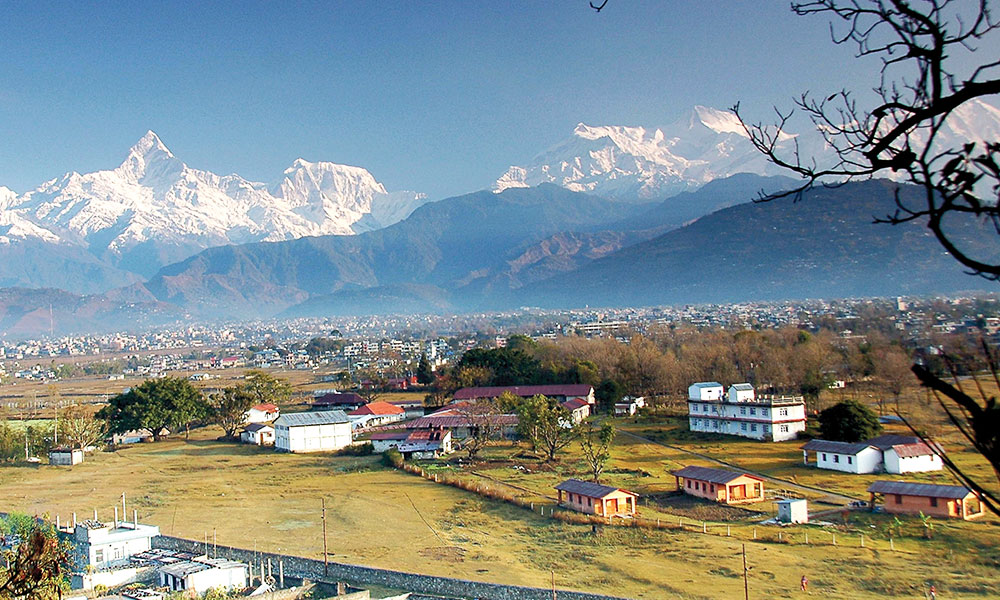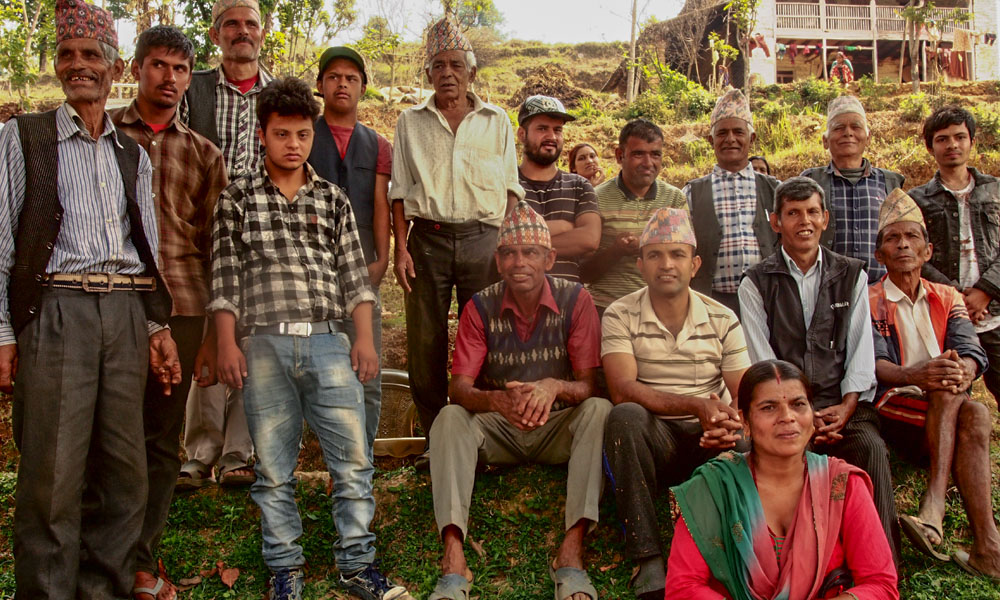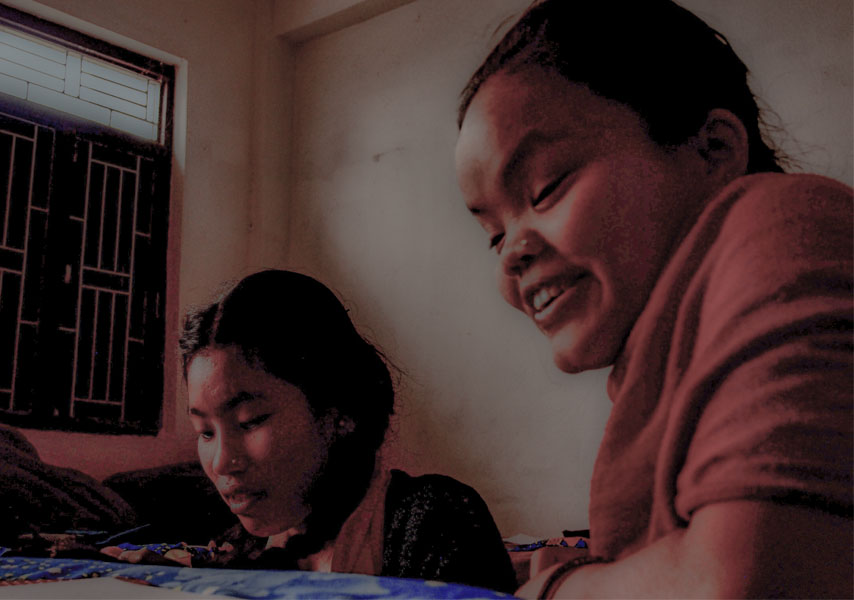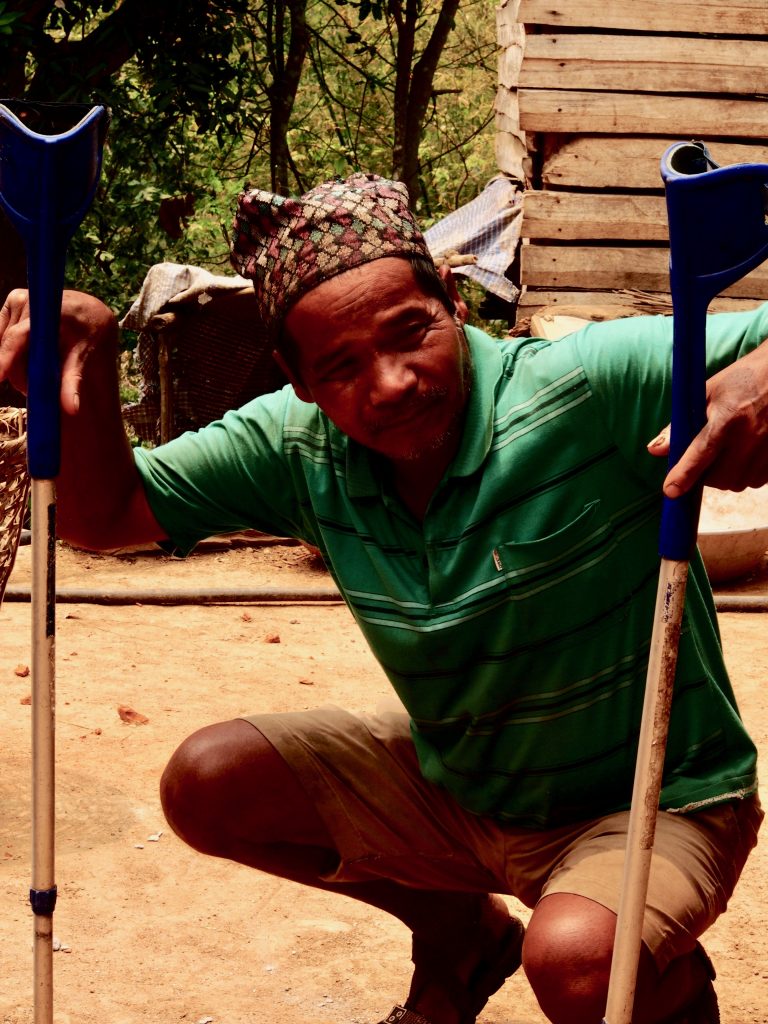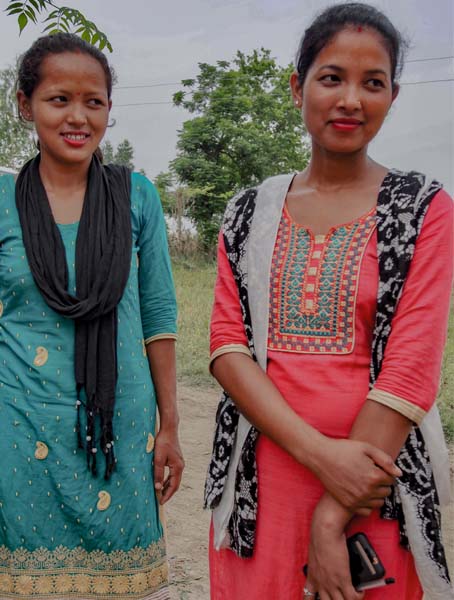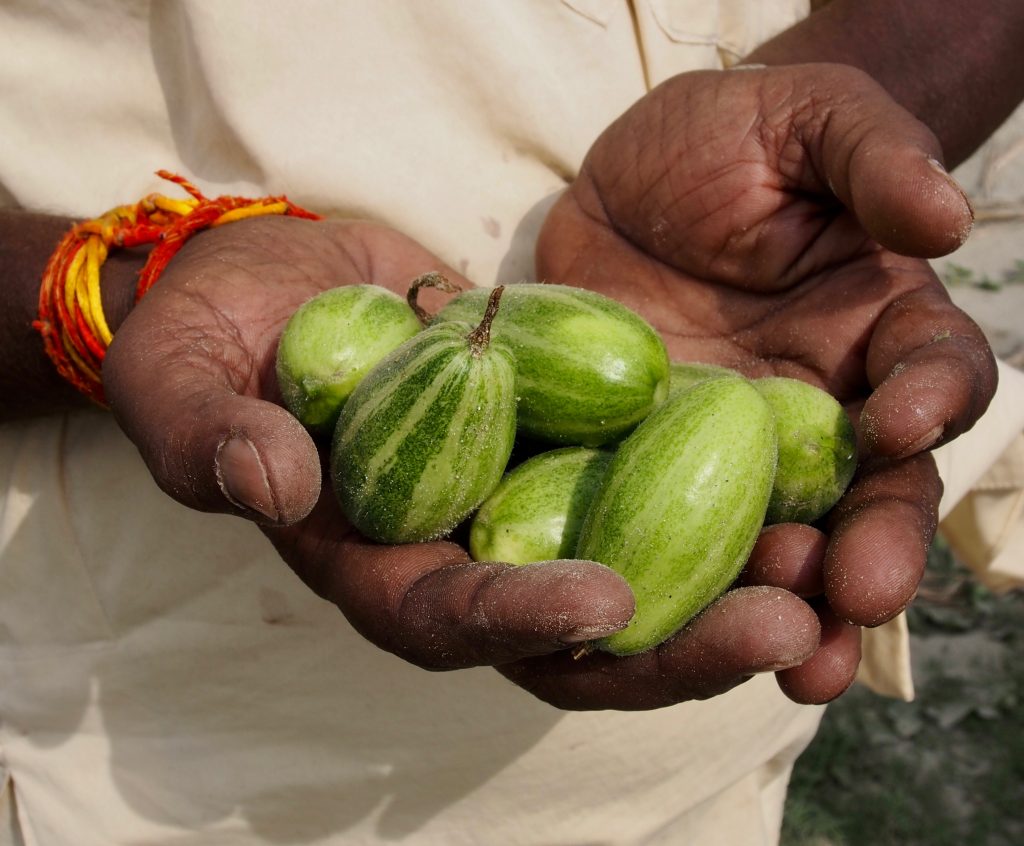Ben Thurley, INF Australia’s Relationships Manager and Cherry Mawson, INF Australia’s Communications Officer recently spent two weeks in Nepal visiting INF projects and seeing God’s work first hand in some of the most remote parts of the country.
They shared their experience through a series of short stories, collated here for you to catch up on and be encouraged by.
Disability
There is a self-help group meeting in Ward 10 of the Usma Rural Municipality of Parbat District in the mid-west of Nepal. Its name is Aatma Nirbhar = ‘Self Reliant’. [see pic above]
INF Nepal helps form self-help groups as the core of their ‘group action process, helping communities identify issues and strengths, pool resources and take coordinated action to improve the lives and livelihoods of group members and their wider communities.
Aatma Nirbhar is one of the groups formed with and by people with disability and their carers. With a small amount of seed funding from INF Nepal, the group has been able to pool over one lakh [100,000] rupees and have received training and support about care for people with disabilities, to advocate access government disability support and to develop additional livelihood options, such as chicken and goat rearing.
The most profound change, though, they tell us is a change of heart and mind. Where once people with disabilities were addressed in public by a pejorative name for their disability [‘cripple’, ‘spastic’, ‘blind boy’], now they are called by name. Where once a sibling with down syndrome and other disabilities was kept in a pen while other family members worked, now he is received as a beloved brother and son.
INF Nepal’s work to ensure that people with disabilities receive livelihood and education support, to provide assistive devices or to construct accessible household infrastructures such as ramps or toilets, to provide physiotherapy support and training and to build the capacity of local health facilities is profound.
But the change of heart which undergirds all this work is more profound still.
Voice
The girls fall quiet when we step into their dorm room at Shree Saraswoti Secondary School in Gorkha, cool and dimly lit by the fading afternoon sun.
Introductions, of course, come first. Eager to practise my Nepali and not sure of the students’ English skills, I tell them in Nepali, “I’m Ben Thurley and I work with INF Australia.”
One of the students, a fifteen-year-old, eager to practise her English and not sure of our Nepali skills, tells us in English, “I am Supriya Nepali.” She is confident and friendly, clearly a leader among her peers. As the introductions proceed, the affection and trust shared among these teenage friends is evident.
Introductions concluded, Supriya asks me, “What does your surname mean? Does it tell what caste you are from?”
Nepali, you see, denotes Supriya as someone from a Dalit family. The word Dalit is a name this caste group have taken for themselves, and it means, simply, “the oppressed”. While the caste system no longer has official sanction in Nepal, its effects are ongoing and insidious. Regarded as religiously and socially “impure”, Dalit people are often discriminated against in education or social settings and even now may be locked into low-wage and low-status occupations.
Supriya is also blind. All thirteen male and female students in these dormitories (a small cohort among the school’s 1,300 students) have a visual impairment. Supriya has mastered Nepali and English. She reads and writes Braille in both Nepali and English.
Her home is almost two days travel distant from Saraswoti school – which is named for a goddess of education and wisdom – so during the term, she lives in this dormitory with her student family, her “sisters and brothers”, and their caretaker “mother”.
Already in Year 10, she is eager to complete her secondary education and proceed to college. The braille textbooks for her subjects have not yet arrived at the school, but that doesn’t stop her and her friends. Their teachers take extra care to ensure they follow the class content.
She asks us about studying in Australia. We try to answer helpfully but admit to having little idea what would be involved in even applying.
Female. Low-caste. From a remote-community. A person with a disability. Supriya has more barriers in place against her success than many.
Yet… Loved and supported by family. Studying at a school which supports students with a disability. Assisted by INF Nepal and other organisations to have a safer and more accessible school environment. Surrounded by friends and driven by her own gifts and initiative.
For a moment I am staggered with a sense of delight and absolutely unearned privilege. To have been here. To have met these students. To have found the journeys of our lives intersecting briefly in the fading warmth of an April day in Nepal.
I wonder, as I often do, how we can work together to ensure that every student, every person, is able to experience the life in all its fullness? What I, and we all, can do to help all people receive as a gift and offer as a gift their God-given potential? To bless the world…
Because the world is blessed because Supriya Nepali and so many others whose names and stories I may never hear are with us.
As our conversation finishes, I pray and I find myself trembling before God in whose image we all are made.
Earthquake resilient
When the major earthquake struck Nepal three years ago, Gorkha District [west of Kathmandu] was one of the hardest-hit areas.
In the aftermath of the quake, INF Nepal is working with families and school communities to rebuild shattered homes and school buildings. Prioritising families and school communities that include people with disabilities, INF [in coordination with the Government of Nepal] is providing funds and engineering support to build 105 earthquake-resilient homes across Gorkha and earthquake-resilient accommodation and improved accessibility for students with a disability.
Improved building techniques and a few changes in building materials [corrugated iron for roofs instead of heavy, slate tile] make these homes vastly safer and more robust in the face of earthquake risk. As Nepal is one of the most earthquake-prone countries in the world, these changes can save lives.
As he demonstrates the physical exercises he has learned from INF Nepal’s physiotherapist, Bal Bahadur Kumal, who is the secretary of an INF-supported self-help group beams about the newly-completed house in which he, his wife, Chini Maya, and his family of six now live.
But reconstruction can be difficult and expensive, particularly for poor and marginalised families and groups, which is true for many from the Kumal people group. Three years after the quake, Meena Kumal [no relation to Bal Bahadur] and her husband, who has multiple disabilities, still live in a bare-bone shack along with their two children. As well as funds from INF and the Government of Nepal, they have borrowed money from their self-help group to purchase materials for rebuilding. But with the meagre wages Meena can earn from day labouring or fishing and selling her catch, she has not yet been able to purchase corrugated iron for the roof. Without the roof material, the Government will not release the final grant, and Meena has not yet been able to complete her family’s home.
As we leave the community here, farewelling Bal Bahadur and his family as well as Meena Kumal and her family, I am reminded of Paul’s exhortation to “rejoice with those who rejoice, and weep with those who weep…” [Romans 12:15].
Service
One of the things that has made a deep impression on us is the closeness of INF Nepal staff and volunteers to the communities they serve. Community mobilisers and facilitators are generally local people who live in the communities they work with. They share the sorrows and struggles of their neighbours and bring their passion for their community to their work.
The warmth, insight and persistence of the support and encouragement offered by INF staff and trained volunteers are inspirational.
With insight, humour and skill, staff such as Kanti Sharma [the Community Based Rehabilitation Supervisor for Banke District] and Supriya Neupane [MNCH Team Leader in Banke District] encourage and train individuals and groups to tackle big challenges of disability, mother and child health and to improve their livelihoods.
Local community facilitators/mobilisers, like Ashmita Pun Magar and Sarita Kumari Tharu, receive training and a small amount of financial support. There is always more work to be done than there are hours in their days.
We are blessed to have met them, and so many others. And we are blessed to be able to stand with INF Nepal staff and volunteer community facilitators/mobilisers as they come alongside their communities.
Unity
In a rural community outside Nepalgunj, this inspiring group of women have gathered and worked together to improve their livelihoods. Supported by one of INF Australia’s local partners Milap, within three years they have collectively saved approximately 60 000 rupees [$750 AUD], enabling them to start not one but three small group mushroom farms. They have now registered as an agricultural group, giving them access to government resources!
The women emphasised though that what also made the group important to them was that they did not only talk about money – with Milap’s support, they had discussed previously hard-to-talk-about topics like sexual and reproductive health, providing each other with a new network of support.
Challenges in this community persist, especially around water scarcity, but this group is definitely stronger together. When asked why they were all in blue, they said it was to signify their unity.
The sandy soil by the Rapti River in Mateiya in Nepal’s West seems to hold little promise for growing food. The Rapti’s regular floods deposit large quantities of sand across the fields after every annual inundation.
INF Nepal’s income generation work in the area, though, is helping local farmers produce abundant harvests from the marginal soil. Crops of watermelon and parawal[Pointed Gourd], a local vegetable, fetch good prices at the markets and have helped families here move from subsistence to sufficiency.
Proud of their produce, two members of an INF self-help group couldn’t wait to usher us into their fields and have us taste the fruit of their labour.



